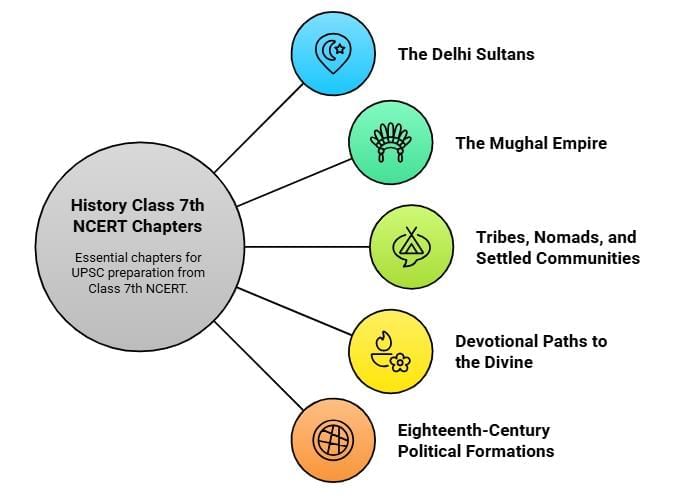Important Chapters from NCERT Class 7 History and Summaries | History for UPSC CSE PDF Download
| Table of contents |

|
| Introduction |

|
| Why NCERTs are Important for History? |

|
| Important Chapters of History Class 7th NCERT for UPSC |

|
| Preparation Tips |

|
Introduction
History is an important subject for UPSC aspirants because it’s interesting and easy to follow like a story. The UPSC history syllabus includes ancient, medieval, and modern Indian history.
In the Prelims, around 10–15 questions are anticipated and a big role in Mains (GS Paper I). For those preparing for the general studies papers, the Class 7 NCERT book “Our Pasts – II” is key for medieval history. Chapters 3, 4, 7, 8, and 10 cover important topics like kingdoms, cultural movements, and the start of British rule. These align with UPSC’s focus on timelines, rulers, and society.
Why NCERTs are Important for History?
NCERT textbooks, especially Class 7’s “Our Pasts – II,” are the foundation for UPSC history preparation due to:
- Clarity and Simplicity: The narrative style of NCERT textbooks is clear and easy to understand, which aids in simplifying complex historical events.
- Alignment with UPSC Syllabus: These textbooks cover crucial topics in medieval history that are relevant for both UPSC Prelims and Mains, including notable rulers, their policies, and cultural advancements.
- Factual Accuracy: NCERTs provide reliable and accurate information, making them suitable for building a strong foundation before delving into more detailed texts.
- Wide Coverage: The textbooks encompass essential themes such as administration, society, and culture, which are commonly featured in UPSC examinations.
- Recommended by Experts: Both older and newer versions of NCERTs are highly recommended for their concise yet comprehensive content, making them ideal for beginners in history preparation.
Important Chapters of History Class 7th NCERT for UPSC
The following chapters from Class 7 NCERT “Our Pasts – II” are critical for UPSC preparation:
Chapter 3: The Delhi Sultans
Important topics to cover:
- Rise of Delhi Sultanate (1206–1526 CE).
- Dynasties: Mamluk, Khalji, Tughlaq, Sayyid, Lodi.
- Iqta system and Alauddin Khalji’s market reforms.
- Indo-Islamic architecture (e.g., Qutb Minar).
Chapter 4: The Mughal Empire
Important topics to cover:
- Establishment and expansion of the Mughal Empire (1526–1857 CE).
- Key rulers: Babur, Akbar, Shah Jahan, Aurangzeb.
- Mansabdari system and Zabt revenue system.
- Cultural contributions: Taj Mahal, Mughal paintings.
- Decline of the Mughal Empire and factors contributing to it.
Chapter 7: Tribes, Nomads, and Settled Communities
Important topics to cover:
- Social structures of tribes, focusing on groups like the Gonds and Ahoms.
- The transition of tribes towards settled communities.
- Interactions between tribes and states.
Chapter 8: Devotional Paths to the Divine
Important topics to cover:
- Bhakti and Sufi movements.
- Saints: Kabir, Guru Nanak, Chaitanya.
- Syncretic philosophies and cultural impact (poetry, music).
Chapter 10: Eighteenth-Century Political Formations
Important topics to cover:
- Mughal decline and regional powers (Marathas, Sikhs, Awadh).
- Entry of European powers (British, French).
- Key battles (e.g., Plassey).
Preparation Tips
- Create Timelines: Make a timeline that includes the rulers and significant events in medieval history from 1206 to 1757 CE.
- Short Notes: Prepare concise summaries of dynasties, policies, and cultural aspects in bullet points for quick reference.
- Revise Often: Review chapters 2–3 times, treating history like a story.
- Practice Questions: Solve UPSC past papers (2015–2025) and mock tests.
- Link Themes: For the Mains exam, connect political, social, and cultural aspects to provide a comprehensive analysis.
- Supplementary Reading: Use old NCERTs (e.g., Satish Chandra’s “Medieval India”) for additional insights and depth in your understanding.
- Flashcards: Create flashcards for important rulers, events, and key terms to facilitate quick revision and reinforce your memory.
|
210 videos|855 docs|219 tests
|
FAQs on Important Chapters from NCERT Class 7 History and Summaries - History for UPSC CSE
| 1. What are the important chapters of History Class 7th NCERT for UPSC? |  |
| 2. Why is Chapter 4: The Mughal Empire important for UPSC preparation? |  |
| 3. How can Chapter 10: Eighteenth-Century Political Formations help in understanding the political landscape of that era? |  |
| 4. What is the significance of Chapter 7: Tribes, Nomads and Settled Communities in Indian history? |  |
| 5. How does Chapter 8: Devotional Paths to Divine contribute to the understanding of religious practices in India? |  |
















